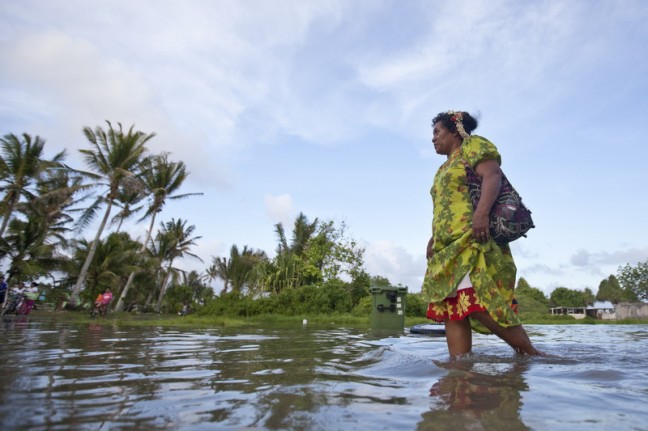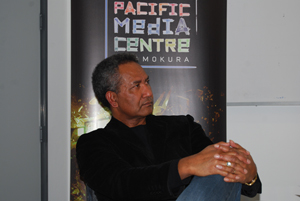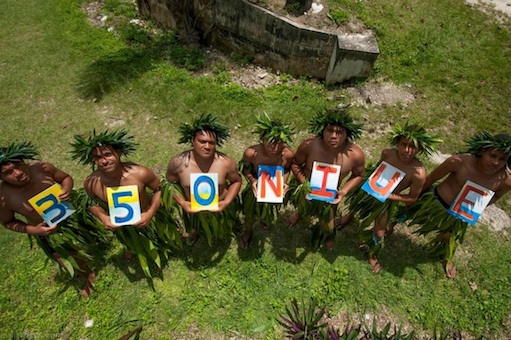
AUCKLAND (Pacific Scoop / Pacific Media Watch): Climate change is top of the agenda, as the Pacific Islands Forum gets underway today.
Host country Marshall Islands is calling for strong committed action on preventing and responding to climate change, as it welcomes delegates from fifteen member states to the renewable village that will play host to the next four days of talks.
Marshall Islands Forum Minister Phillip Muller said the Majuro Declaration was about “tangible action” rather than a “you-go-first” approach to climate policy.
“In the Pacific, we cannot afford to wait. We want the Forum to set the stage for a new, bolder approach,” he wrote in a Washington Post op-ed in June..jpg)
“We call on not just governments but also intergovernmental organizations, the private sector and civil society to sign on to our declaration with their own measurable commitments aimed at averting a climate catastrophe.”
A political priority
Auckland University Centre of Pacific Studies researcher Dr Steven Ratuva said climate change was widely recognised as a political priority.
“Villages have been relocated, a lot of money has been put into programmes, and we have to ask what action is being taken.”
He said Australia and New Zealand need to look at both preventing and responding to the realities of climate change.
“There needs to be short term measures, such as building protective walls and providing food security, but if things get worse, Australia and New Zealand need to provide a place for people to move.”
Kiribati, Northern Mariana Islands and other Pacific countries have already raised the alarm on rising sea levels, having lost land and fishing grounds to changing tides.
And, even while Australian Prime Minister Kevin Rudd is announcing plans to relocate asylum seekers to Nauru, the small island state is considering how it will relocate its own population.
Evacuating islands
The low-lying Carteret Islands of Bougainville are already being gradually evacuated, and Oxfam New Zealand director Barry Coates said it was an “instructive example” of what climate change meant for the Pacific.
“It is an economic problem of relocation, but it is also the social cost of having to leave the graves of ancestors, traditional fishing grounds and sources of livelihoods.”
He said the significance of “land and place” to Pacific people should not be understated, and the long-term effects of displacement and replacement could be severe.
Coates said even the World Bank’s conservative predictions of climate change made for “sobering reading” for the future.
“Climate change is an immediate threat – and people hurt first and worst at the most poor and vulnerable,” he said.
“Salination, sea surges, king tides, extreme weather events, periodic drought, and extreme precipitation – we are likely to see a worsening of these kinds of impacts.”
An existential threat
The World Wildlife Fund, one of several non-governmental organisations represented at last month’s Pacific Islands Development Forum in Fiji, had serious concerns about the threat of climate change to both people and wildlife in the region.
Peter Hardstaff, head of campaigns at WWF New Zealand, said climate change poses an “existential threat” to Pacific nation-states, and predicted point-eight-degree temperature rises could literally wipe many countries “off the map”.
“The biggest contributor to climate change is transport and the biggest threat of climate change is sea-level rises. The people in the Pacific hardest-hit have contributed least to the problem,” he said.
While New Zealand and Australia were not as severely affected by climate change, he said it was “imperative” for policymakers and corporations to take action towards renewable energy and carbon emission reduction.
He said the most critical priorities were choosing public transportation over cars, and moving away from a dependence on non-renewable energy sources.
While “temperature changes and extreme weather affects different species in different ways”, even moderate changes in temperature could affect species like penguins and tuatara.
Trans-Pacific action planned
Climate policy group 350 Pacific operates in fourteen countries around the Pacific, and launched a “we are not drowning, we are fighting” Pacific Warriors campaign earlier this year.
Regional coordinator Koreti Mavaega Tiumalu said the group would use the Forum to campaign for what he saw as the very future of the Pacific Islands.
“We need to increase the world’s awareness of what climate change means for the Pacific – the impacts are devastating. We also need to try and influence world leaders decisions on fossil fuel – that we need to keep it in the ground if we are to have a fighting chance,” Tiumalu said.
“The future of the Pacific Islands and the fossil fuel industry cannot co-exist – and it’s the fossil fuel industry that needs to back down – not the Pacific Islands. We are the last generation that can do something about this. Beyond us, it will be too late.”
Kern Mangan-Walker, spokesperson for New Zealand climate lobby group Generation Zero, said Pacific economies are vulnerable and his country’s government needs to show leadership on the issue.
“New Zealand is perceived as being ahead of the trend in implementing effective environmental legislation, and we have an important role to play in leading the way forward when it comes to moving beyond fossil fuels,” he said.
“That includes decreasing global carbon emissions to prevent the worst effects of climate change before we pass into a region of unpredictability that will occur once we reach more than a two degree temperature increase post-1990 levels.”
New Zealand will have the largest delegation at the forum, with Prime Minister John Key and 44 other delegates due to arrive this afternoon.
After a Small Nations Meeting and Opening Ceremony today, the crux of Forum discussion will begin tomorrow.
Member states will be joined by representatives from 13 donor governments for post-Forum talks on Friday.
This work is licensed under a Creative Commons Attribution-NonCommercial 3.0 New Zealand Licence.




